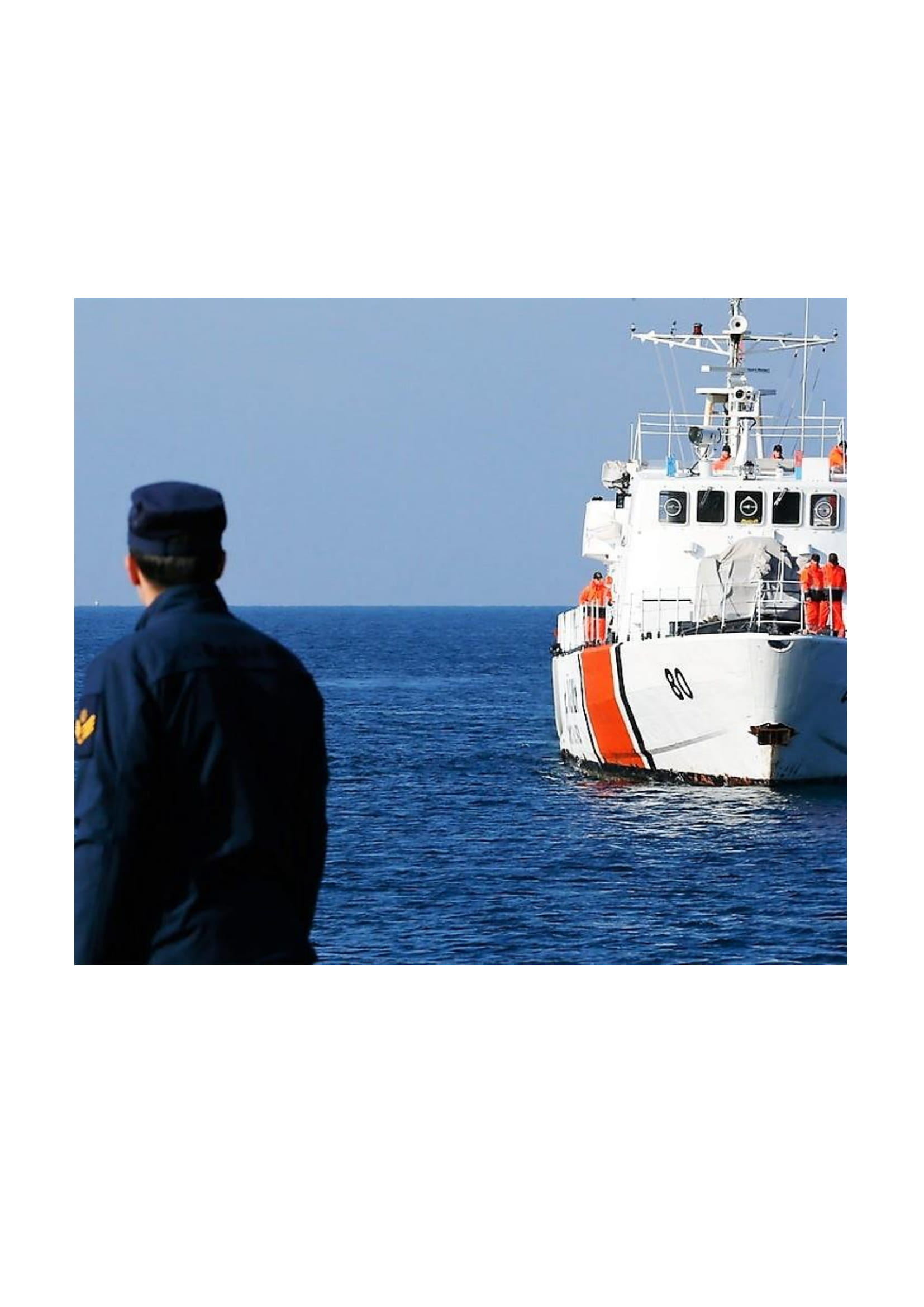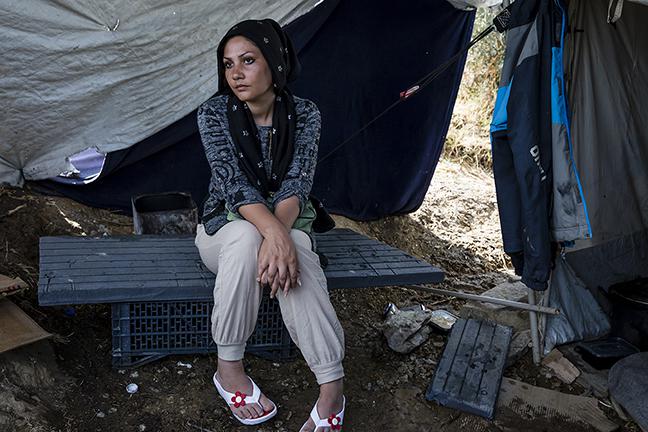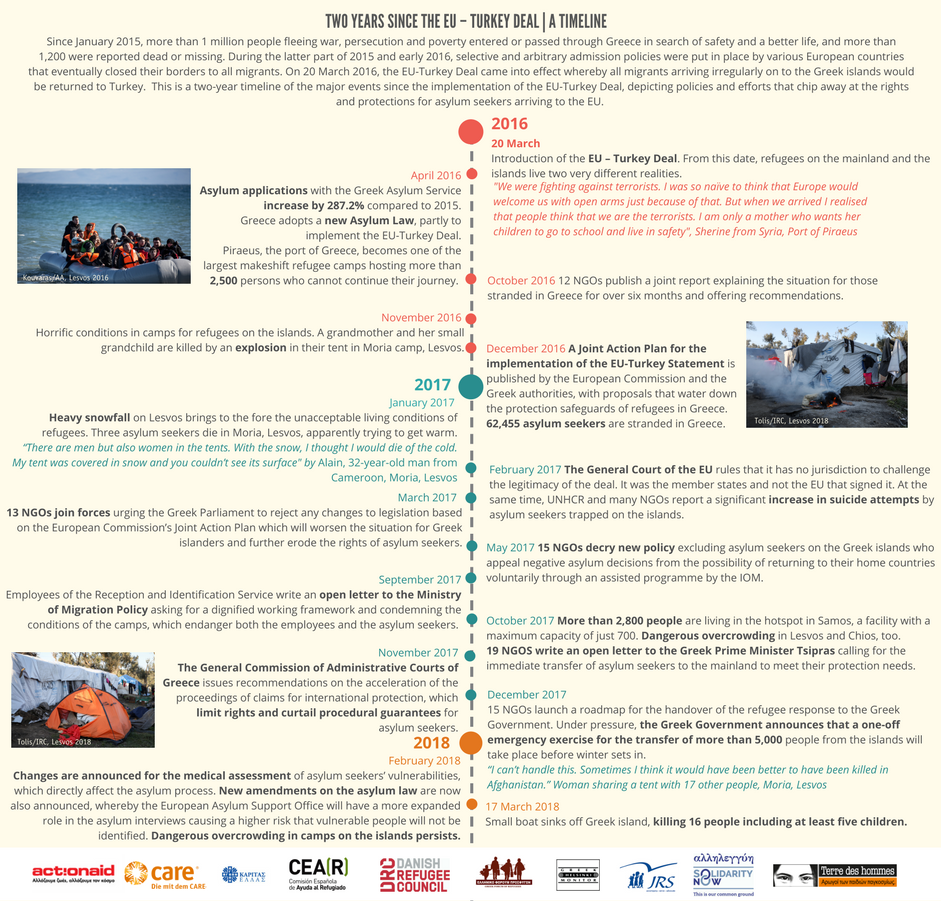This March two years have passed since the E.U.-Turkey Statement. A 'deal', which even if it lowered the numbers of the arrivals from Turkey to the Greek islands, it also created a problematic situation, both for the asylum seekers, who are trapped in the islands, and for the local communities, who are protesting. Below there are some news articles and some reports by international organizations on the situation.
For two years, we documented the lives of refugees stranded on the Greek island of Chios. This is an interactive story of individuals trapped in limbo, chronicling their journeys through the EU/Turkey deal. The EU/Turkey deal was introduced on the 20th March 2016. In exchange for billions of euros and promises of visa-free travel for Turkish citizens in Europe, Turkey agreed to reduce the number of refugees leaving the country and take back 'irregulars' reaching Greece, including asylum seekers. Hundreds of thousands of people fled to Europe via Turkish shores in 2015 and 2016 and continued on to other European countries. In response, Europe closed the Balkan borders and signed a deal that meant all those who reached the Greek islands should be deported to Turkey.
Berlin, Brussels blame Greece for undermining the EU-Turkey deal | Keep Talking Greece | 19 Mar. 2018
Unnamed officials in Berlin, Brussels and the EU’s border agency Frontex,blame Greece for undermining the EU-Turkey refugee and migrants deal as it moved people form the overcrowded camps on the islands to the mainland. Data published by the German newspaper Die Welt suggest that Greece has been undermining the European Union-Turkey deal signed two years ago to stem the flow of refugees and migrants to the continent... Read the rest of the article >>>
The EU Turkey deal — access denied! What have we learned in the last two years? | By RefuComm on Medium.com
In March 2016, the European Union signed a deal with Turkey with the aim of stemming the inflow of people to the continent. The deal defined Turkey as a “safe third country”, stating that every person arriving irregularly to Greece after March 20th 2016 should be returned to Turkey, unless the applicant can prove that Turkey is not safe in their specific case. Read the rest of the report >>>
AYS SPECIAL on two years of EU-Turkey Deal: Refugees Stopped in Motion | By Are You Syrious on Medium.com
Two years since the EU-Turkey deal was implemented, and the world continues to warm, wars continue to hurt, and people are continuing to be forced onto the move. Perhaps it is time to acknowledge that fortification and exclusion are not working. Hannah Wallace Bowman from Lighthouse Relief Hellas writes for AYS on the deal and its consequences. Read the rest of the report >>>
EU/Turkey: Two years on, deal continues to fail thousands of people seeking asylum | Doctors Without Borders (MSF) | 16 Mar. 2018
Louise Roland Gosselin, Head of Mission Greece
Two years ago, the European Union and its member States decided to historically fail thousands of people and to compromise the very concept of asylum by agreeing to return to Turkey asylum seekers seeking safety in Europe. Since then, our medical teams in Greece have witnessed an endless stream of misery and desperation from the thousands of men, women and children who continue to arrive on Greek shores and are trapped on the Greek islands. It’s them who pay the real cost of this dirty deal. Read the rest of the report >>>
Greece: Europe's Two-Year-Old Deal with Turkey Traps Thousands in Disastrous Conditions | Doctors Without Borders (MSF) | 17 Mar. 2018
ATHENS /NEW YORK, MARCH 17, 2018—Two years after the signing of a deal between the European Union (EU) and Turkey, Europe's cynical strategy to contain and return people seeking asylum has trapped thousands of vulnerable people in disastrous conditions on Greek islands, the international medical humanitarian organization Doctors Without Borders/Médecins Sans Frontières (MSF) said today, calling on Greek and EU authorities to increase transfers to the Greek mainland. MSF teams warn of a mental health crisis in camps on Greece's islands, such as Lesvos and Samos, where people seeking asylum lack adequate protection, water, sanitation, or medical care and are prevented from moving to the mainland. Read the rest of the report >>>
The Stories of Asylum Seekers Trapped in Greece | Human Rights Watch | 18 Mar. 2018
On EU-Turkey Deal Anniversary, Greece Should End Containment Policy
Zahra Mosawi, 28, from Afghanistan is trapped on Lesbos, Greece. Despite being a survivor of gender-based violence and in need of psychosocial support, she’s been unable to find help in the camp. © 2017 ZALMAÏ for Human Rights Watch
Deadly, abysmal, dire, fear-inducing, insecure, cold, violent, humiliating, unfair… I’ve used these words often over the past two years to describe the situation for thousands of asylum-seeking women, men, and children trapped on Greece’s islands. They are pawns in a deal struck between the European Union and Turkey that empowers Greece to try to force most asylum seekers back to Turkey without first hearing their claims.
EXPERT VIEWS: THE E.U.-TURKEY DEAL AFTER TWO YEARS | HAREKACT - Reporting on the Turkish-EU Border Regime | 22 Mar. 2018
Via Newsdeeply – On the second anniversary of the E.U.-Turkey deal that curbed refugee boats to Greece, experts from Turkey, Greece and Germany weigh in on the agreement’s impact on refugees and on Europe. The E.U.-Turkey statement of March 20, 2016, was a turning point in Europe’s crisis over refugees. Under the deal, Turkey would prevent boats leaving its shores for Greece, while Athens would return arriving migrants to Turkey. In exchange, the E.U. would increase funding and resettlement for refugees in Turkey, along with other political sweeteners.
Very little of the deal’s original provisions have been implemented, but the number of boats did drop drastically (while continuing to fluctuate, just as the journey continues to be deadly). Coming after 1 million people arrived in Europe in 2015, E.U. policymakers continue to defend the deal as a major success. At the same time, human rights groups say many of their warnings about the agreement have been realized: Refugees are warehoused in dire conditions on the Greek islands while Turkey threatens a new surge in refugee boats to ward off criticism about its human rights situation.
On the second anniversary of its signing, we asked experts from Turkey, Greece and Germany weigh in on the agreement’s impact on refugees and on Europe:
Marie Walter, researcher, Jacques Delors Institut, Berlin, and doctoral fellow, Freie Universität Berlin
Sevda Tunaboylu, PhD candidate at Pompeu Fabra University, Barcelona
Dimitris Christopoulos, head of the International Federation for Human Rights (FIDH)
Refugees out of sight, out of mind two years on from EU-Turkey deal | The Conversation | 19 Mar. 2018
An agreement between the European Union and Turkey that came into force two years ago on March 20 2016, has reduced the number of migrants arriving on the shores of Greek islands and, however precariously, salvaged the integrity of the Schengen visa system. But while the EU-Turkey Joint Action Plan was justified as a measure that would reduce deaths at sea and protect human dignity, the dramatic increase in the death rate of those crossing the Mediterranean in 2016 and deteriorating conditions for migrants in Turkey and Greece expose a reality at odds with that rhetoric.
Instead, the plan reflects the philosophy that has long informed the EU’s migration policy: containment.
ΤIMELINE OF THE MAJOR EVENTS SINCE THE IMPLEMENTATION OF THE EU-TURKEY DEAL | SolidarityNow | 22 Mar. 2018
Since January 2015, more than 1 million people fleeing war, persecution and poverty entered or passed through Greece in search of safety and a better life, and more than 1,200 were reported dead or missing. During the latter part of 2015 and early 2016, selective and arbitrary admission policies were put in place by various European countries that eventually closed their borders to all migrants. On 20 March 2016, the EU-Turkey Deal came into effect whereby all migrants arriving irregularly on to the Greek islands would be returned to Turkey. This is a two-year timeline of the major events since the implementation of the EU-Turkey Deal, depicting policies and efforts that chip away at the rights and protections for asylum seekers arriving to the EU.
JOINT PRESS CONFERENCE: TWO YEARS AFTER THE EU-TURKEY DEAL | SolidarityNow | 21 Mar. 2018
To mark the occasion of the second anniversary of the EU-Turkey Joint Statement (Deal, in essence), yesterday we held, along with other NGOs, a joint press conference titled: “Two years after the EU-Turkey Deal: a humanitarian tragedy for refugees and asylum seekers”.
The press conference was hosted at the Journalists’ Union of Athens Daily Newspapers (ΕΣΗΕΑ). Participants included journalists, as well as representatives of EU embassies, state institutions, and civil society organizations. The conference speakers covered the main aspects of the refugee issue from a humanitarian, legal, and political perspective. Read the rest of the report >>>
Statement on the occasion of the 2nd anniversary of the EU-Turkey deal | Caritas Europe | 15 Mar. 2018
As a result of the EU-Turkey deal that was struck two years ago, over 13,000 women, children, and men are confined to reside in humiliating conditions in overcrowded reception facilities or in filthy makeshift camps on the Greek islands nearby Turkey’s coast. Caritas Europa and Caritas Hellas (Greece) call on EU and Greek decision-makers to transfer these people to the mainland and to give them a chance to rebuild their lives. Read the rest of the statement >>>
EU-Turkey deal: an error in the system | FreedomNews UK | 22 Mar. 2018
Two years ago, the EU-Turkey deal on refugees came to force. Since then, every person arriving ‘irregularly’ on Greek islands should be returned to Turkey. That would include asylum seekers as well as “economical migrants”. In exchange, Turkey would receive €6 billion to assist the refugee community hosted in the country, Turkish nationals would be granted visa-free travel to Europe. It was also decided that once the number of “irregular arrivals” dropped, a “voluntary” humanitarian scheme to transfer Syrians from Turkey to other European countries would be activated. However, the principal assumption behind the deal: that Turkey is a safe place for refugees, was flawed. Here, Are You Syrious presents their report from the ground on the effects of the deal so far. Read the rest of the article >>>
Two years after the EU-Turkey deal: The key questions | Terre des hommes via ReliefWeb | 20 Mar. 2018
Why is Greece forcing asylum seekers to remain on the Greek islands?
An EU-Turkey “statement” from March 2016 committed Turkey to accept the return of all asylum seekers who reached the Greek Islands by traveling through Turkey and crossing the sea. In return the EU agreed to provide billions of euros in aid and other benefits, and to resettle an equal number of Syrians who were already in Turkey. The Greek government, under a “containment” policy, decided to keep asylum seekers confined to the islands to facilitate their speedy processing and return to Turkey. Read the rest of the report >>>




